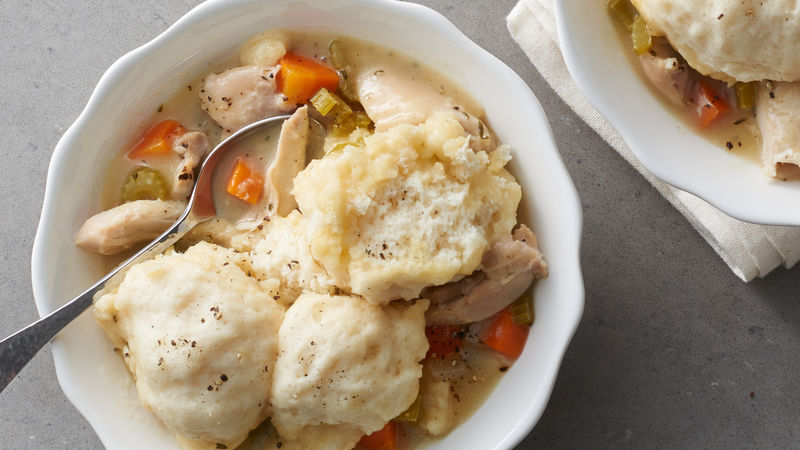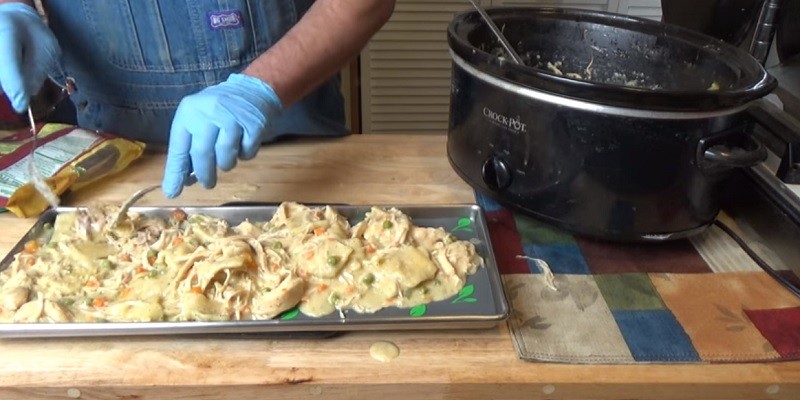Last Updated on November 19, 2023 by Pauline G. Carter
Yes, you can freeze chicken and dumplings. Chicken and dumplings can be safely stored in the freezer for future enjoyment.
Chicken and dumplings are a comforting and delicious dish that combines tender chicken, hearty dumplings, and flavorful broth. Whether you have made a large batch or have leftovers from a meal, freezing chicken and dumplings is a convenient way to preserve them for later.
Freezing them allows you to have a quick and easy meal on hand whenever you crave it. When properly stored in an airtight container or freezer bag, frozen chicken and dumplings can last for up to three months in the freezer. Freezing them not only extends their shelf life but also helps to maintain their texture and taste. We will explore how to freeze chicken and dumplings, the best method for reheating them, and some helpful tips for getting the best results. So, let’s dive in and learn how to freeze chicken and dumplings the right way.

Credit: www.bettycrocker.com
Freezing Impacts
Freezing chicken and dumplings allows you to enjoy this comforting dish at a later time without compromising its taste and quality. However, it’s important to understand the impacts freezing can have on the texture, flavor, and safety of the dish. Let’s take a closer look at each of these factors.
Examining The Texture Changes Post-freezing
When you freeze chicken and dumplings, the texture of the dish can be affected. The dumplings may become softer or slightly mushy after thawing and reheating. This is because freezing causes the water in the dumplings to expand, which can lead to changes in their structure. However, this texture change is generally minimal and does not significantly alter the overall enjoyment of the meal.
Flavor Retention In Frozen Chicken And Dumplings
The good news is that freezing chicken and dumplings does not greatly affect the flavor of the dish. The flavors of the chicken, vegetables, and seasonings can still be wonderfully preserved even after being frozen. This means that you can savor the same delicious taste when you defrost and reheat the dish at a later time. To ensure maximum flavor retention, store the chicken and dumplings in airtight containers or freezer bags to prevent freezer burn and the absorption of other odors.
Safety Considerations For Freezing Soups And Stews
When it comes to freezing soups and stews, including chicken and dumplings, safety is a crucial consideration. The process of freezing can slow down the growth of bacteria, but it does not eliminate them entirely. Therefore, it’s important to follow safe freezing practices to maintain the quality and safety of the dish.
- Make sure the chicken and dumplings are cooled down to room temperature before transferring them to the freezer. Rapid cooling helps prevent bacterial growth.
- Divide the soup or stew into smaller portions before freezing. This allows for faster and more even freezing, as well as easier portion control when you’re ready to enjoy the dish.
- Label the containers or bags with the date of freezing to ensure that you use them within a safe timeframe. Generally, frozen chicken and dumplings can be stored for up to 3 months without significant loss of quality.
- Thaw frozen chicken and dumplings in the refrigerator overnight or defrost them using the microwave on the defrost setting. Avoid thawing at room temperature to minimize the risk of bacterial growth.
- Once thawed, reheat the chicken and dumplings thoroughly to an internal temperature of 165°F (74°C) to ensure that any bacteria present in the dish are killed.
By understanding the impacts of freezing on the texture, flavor, and safety of chicken and dumplings, you can confidently freeze this comforting meal for future enjoyment. Just remember to follow proper freezing and reheating practices to maintain its quality and taste.
Freezing Process Explained
Freezing chicken and dumplings is a great way to preserve this delicious comfort food for later consumption. Whether you have leftovers from a big batch or you want to prepare a large quantity in advance, freezing chicken and dumplings is a convenient and practical option. However, it’s important to follow the proper freezing process to maintain the flavor and texture of your dish. In this section, we will explore the steps involved in freezing chicken and dumplings, including selecting the right containers, a step-by-step guide, and tips to prevent freezer burn.
Selecting The Right Containers For Freezing
Choosing the right containers is crucial when it comes to freezing chicken and dumplings. The ideal containers should be airtight and able to withstand the freezing temperatures without cracking. Here are a few options:
- Plastic freezer bags: These are convenient and space-saving, as they can be laid flat for efficient storage.
- Freezer-safe plastic containers: Opt for containers that are specifically designed for freezer storage. They should have tightly fitting lids to prevent air exposure.
- Glass containers: If using glass containers, ensure they are freezer-safe to avoid breakage due to rapid temperature changes. Make sure to leave enough headspace for expansion while freezing.
Step-by-step Guide To Freezing Chicken And Dumplings
Follow these simple steps to freeze your chicken and dumplings:
- Allow the chicken and dumplings to cool completely before freezing. This prevents condensation and ice formation during the freezing process.
- Divide the chicken and dumplings into individual or family-sized portions, depending on your needs.
- Transfer the portions into the selected freezer containers, leaving some space at the top to allow for expansion.
- Seal the containers tightly to prevent any air from entering.
- Label the containers with the date and contents for easy identification.
- Place the containers in the freezer, ensuring they are placed on a flat surface to prevent spillage.
Tips To Prevent Freezer Burn
Freezer burn can affect the quality and taste of your chicken and dumplings. By following these tips, you can prevent freezer burn:
- Ensure the containers are sealed tightly. Any exposure to air can cause freezer burn.
- Remove as much air as possible from plastic bags before sealing.
- Use freezer wrap or aluminum foil to wrap individual portions before placing them in the containers.
- Place a layer of plastic wrap or parchment paper directly on the surface of the chicken and dumplings to provide an additional barrier against air exposure.
- Store the containers away from the freezer door, as it experiences more temperature fluctuations.
- Avoid frequent fluctuations in freezer temperature by not opening the freezer unnecessarily.
Now that you have successfully frozen your chicken and dumplings, it’s important to know the proper thawing methods to ensure optimal quality. Whether you prefer a slow thaw in the refrigerator or a quick thaw in the microwave, proper thawing techniques will preserve the taste and texture of your dish. Stay tuned for the next section to learn more!
Reheating Frozen Chicken And Dumplings
Reheating frozen chicken and dumplings is a convenient way to enjoy this classic dish without the hassle of cooking it from scratch each time. However, it’s essential to follow the best practices to maintain the flavor and texture of the dish. In this section, we’ll discuss the best techniques for reheating chicken and dumplings, whether you prefer using a microwave or an oven. We’ll also explore the signs that indicate when chicken and dumplings have spoiled, ensuring you can enjoy a delicious and safe meal.
Best Practices To Maintain Flavor And Texture
Properly reheating frozen chicken and dumplings is crucial to preserve the quality and taste. Here are a few best practices to follow:
- Thaw before reheating: It’s recommended to thaw frozen chicken and dumplings in the refrigerator overnight before reheating. This gradual thawing process helps the dish retain moisture and prevents it from becoming soggy.
- Use a low heat setting: When reheating chicken and dumplings, whether on a stovetop, oven, or microwave, it’s important to use a low heat setting. This gentle heat prevents overcooking the chicken and maintains the dumplings’ texture.
- Stir and distribute heat evenly: To ensure even reheating, stir the chicken and dumplings occasionally, especially if using a stovetop or microwave. This helps to distribute the heat uniformly throughout the dish, avoiding any cold spots.
- Season as needed: Before reheating, you may want to taste the chicken and dumplings and adjust the seasoning accordingly. Adding a pinch of salt or other herbs and spices can enhance the flavors.
Microwave Versus Oven Reheating Techniques
When it comes to reheating chicken and dumplings, you have the option to use either a microwave or an oven. Each method has its own advantages and considerations:
| Microwave Reheating | Oven Reheating |
|---|---|
|
|
Signs That Chicken And Dumplings Have Spoiled
While freezing can prolong the shelf life of chicken and dumplings, it’s essential to check for signs of spoilage before reheating:
- Foul odor: If the dish has an unpleasant or sour smell, it’s an indication that the chicken and dumplings have gone bad.
- Mold or visible signs of spoilage: Inspect the dish for any mold growth or unusual discoloration. If present, discard the food.
- Unusual texture: If the chicken feels slimy or the dumplings appear mushy, it’s best to avoid consuming them.
- Taste test: If you’re uncertain about the freshness, take a small bite. If the flavor is off or the texture is unpleasant, it’s a clear sign that the chicken and dumplings are spoiled.
By following these guidelines, you can enjoy reheated chicken and dumplings that are flavorful, tender, and safe to eat.
Frequently Asked Questions Of Can You Freeze Chicken And Dumplings?
Can You Freeze Chicken And Dumplings?
Yes, you can freeze chicken and dumplings for later consumption. Freezing them is a convenient way to extend their shelf life.
How Long Can You Freeze Chicken And Dumplings?
You can freeze chicken and dumplings for up to 3 months without compromising their taste and quality. Make sure to store them properly in airtight containers or freezer bags.
What Is The Best Way To Freeze Chicken And Dumplings?
To freeze chicken and dumplings, let them cool completely, then transfer them to a freezer-friendly container. It is recommended to portion them into smaller servings for easier reheating.
How Do You Thaw Frozen Chicken And Dumplings?
The best way to thaw frozen chicken and dumplings is to transfer them from the freezer to the refrigerator and let them thaw overnight. Alternatively, you can defrost them in the microwave using the defrost setting.
Can You Freeze Homemade Chicken And Dumplings?
Yes, absolutely! Homemade chicken and dumplings can be frozen just like store-bought ones. Follow the same freezing and thawing instructions to preserve their flavor and texture.
Can You Freeze Chicken And Dumplings With Vegetables?
Yes, you can freeze chicken and dumplings with vegetables. However, keep in mind that some vegetables, like potatoes, may change in texture after freezing. Consider blanching them before adding to the dish for better results.
Conclusion
To sum up, freezing chicken and dumplings is a convenient way to preserve this delicious dish for later enjoyment. By following the proper storage techniques, you can ensure that the flavors and textures remain intact. Freezing not only saves time, but it also allows you to have a comforting meal on hand whenever you crave it.
So, go ahead and freeze your chicken and dumplings without worry—your taste buds will thank you later!
About Author (Pauline G. Carter)

Pauline G. Carter is a well-known pet blogger who has written about the world of pets for several years. She is passionate about pets, from cats and dogs to birds, reptiles, and poultry. Her blog, which is updated regularly, is filled with articles and guides on pet care, nutrition, and training. She also shares her experiences and observations on pet ownership, making her blog relatable and informative for pet lovers. She is a true animal advocate and is dedicated to promoting responsible pet ownership. Let’s Go …




